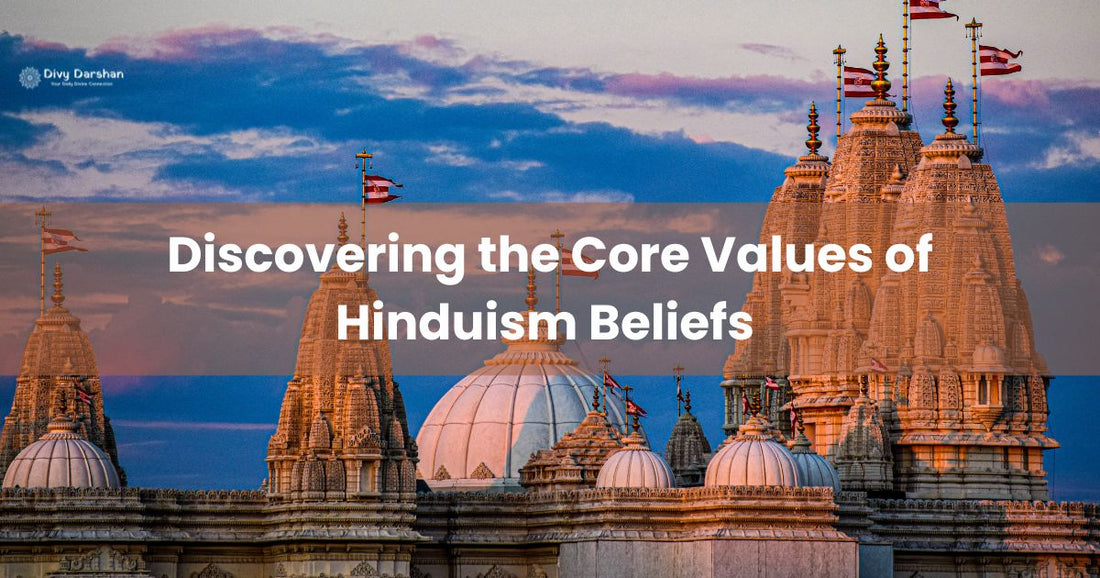As being a Hindu means a lot to me, it is as same as searching deeply into our great spiritual traditions which hardly places you on a spiritual travel towards the self or enlightenment. Hinduism, considered by most probably one of the world's oldest religions, is full of such variety of Hinduism beliefs, rituals and philosophies that have been consistently operating till this day. With this exposition, we delude ourselves into seeing the outlines of core Hindu values that have formed the basis of Indian spirituality for centuries, elucidating its transcendental insights and timeless relevance.
The Concept of Dharma: Navigating Life's Path with Righteousness
यदा यदा हि धर्मस्य ग्लानिर्भवति भारत
अभ्युत्थानमधर्मस्य तदाऽऽत्मानं सृजाम्यहम्।।
परित्राणाय साधूनां विनाशाय च दुष्कृताम्।
धर्मसंस्थापनार्थाय संभवामि युगे युगे।।
In Hinduism beliefs system, the most salient idea is Dharma – order of the universe, as well as all living beings' moral duty. The main idea of Dharma is that the world order should be determined by the duties, correctness, and historical notions of ethics and morality that should guide an individual in his or her life. It gives a person a shining direction and encourages him to live the life of honesty, clean heartedness, and virtue. Hindus usually regard Dharma as the path that brings unity between their actions and divine intentions whereas it is a key vehicle in their spiritual growth and societal harmony.
The Pursuit of Moksha: Liberation from the Cycle of Rebirth
“You need realization of the Self and awareness of the Self in order to go to moksha (ultimate liberation).”
Within the Hindu spirituality, the highest purpose is reached when Moksha (freedom from the circle of creation and destruction) happens. By this prospect moksha has, in a way, the meaning of the religious journey's purpose, which the soul is trying to achieve. This can be considered as a union with the absolute divine. It comes beyond the worldly attachments and material ambitions, consequently marking the way to eternal happiness and enlightenment which is the utopian identity of human beings. Utilizing the power of Karma Yoga, Bhakti Yoga, Jnana Yoga, and Raja Yoga as the means, Hindus endeavor to obtain Moksha, and in the process, become aware of the divine element inherent in themselves, thus breaking away from the reality that hinders their path to Liberation.
The Notion of Karma: Understanding the Law of Cause and Effect
The concept of Karma is at the nucleus of Hindu thought and can be expressed as a Law of Cause and Effect, which regulates the universe. This is the rule of Karma, according to which every act, thought, and intention brings corresponding results, which, in turn, influence the fate of the individual in many lives. The Hindus perceive Karma as the manifestation of the need for right thinking and ethical living, wherein they can nurture the seeds of goodness so as to harvest the inextinguishable spiritual gifts.
Discovering the Diversity of Gods and Goddesses
Hinduism includes the dense collection of deities(devi-devatas), which are the representatives of various aspects of the divine nature and being personifications of the cosmic forces. From the divine mercy and grace shown by Lord Vishnu to the controversial form of Goddess Kali, Hindus worship a wide range of gods and goddesses finding relief, inspiration, and guidance from their deities. This is a kind of recognition which portrays the inner faith in the omnipotence of God and helps one in building a deep sense of spiritual union and affection.
The Principle of Rituals and Ceremonies
Structure and rites of rituals and ceremonies have an enormous spiritual value among Hindus, whereby people can experience communion with the Divine and demonstrate their devotion. Be it a daily prayer/puja, or a complex festival/festivity, Hindus maintain a diversity of rituals to cleanse minds, bodies, and souls, and invite blessings from gods. These rites enhance the divine connection between humanity and the infinite; the after effect being unity, respect, and spiritual elevation.
The Essence of Ahimsa and Compassion
Ahimsa, the non-violence, holds a high rank in Hinduism beliefs, and glorifies values such as compassion, kindness, and reverence for the life of all creatures. An important principle of interconnectedness among all existing living beings makes it possible for Ahimsa to remind us that all life is sacred, and we must do our best to minimize the suffering across the world. A practice of Ahimsa discerns one to internalize sensitivity, consideration, and esteem among all living beings thereby living up to the professed divinity of wideness and balance.
The Eternal Wisdom of Hindu Spirituality
It is the essence of Hindu philosophy that these core values of God, truth, consciousness, non-violence, discipline and an understanding of existence, self and others gives the desired wisdom of life. Through practices and philosophies like Dharma, Moksha, Karma and Ahimsa, Hindus try to get a grip on the entirety of life and understand that they are blessed with the divine within them. Let us move deeper into the realms of Hinduism beliefs and concept of spirituality bring us some useful lessons which should make life more in tune with each other, less harsh, and full of insight while continuing our way through it.

